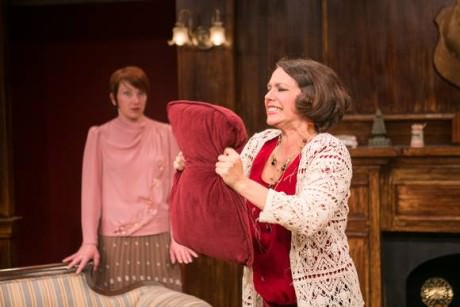The Broadway and West End audiences that made Frederick Lonsdale’s On Approval a hit in the 1920s could not possibly have guessed how this light comedy would play in 2015. Bet they would be surprised. Because this zinger-packed confection is not only a tasty delight about love and romance. In the aftermath of second-wave feminism, it’s a fascinating blast from the past full of pith and vinegar about women, men, and sex.
Four sharp-tongued characters and a cheeky plot keep one bouncing back and forth between amusement and bemusement. Two of the characters are women of wealth; two of the characters are men of lowly means. The play is set in England in 1927, and as it begins, in an upper-crusty Mayfair home, we learn that each rich woman is smitten with one of the poor men. From then on in this role-reversed comedy of coupling, jokes about finances and infatuation buzz about like stingers.

Maria, whose income would be equivalent today to about $2 million, is played grandly with urbane self-absorption by Tricia McCauley. Helen, who is heir to a pickle fortune and one of England’s most affluent, is played sweetly with girlish guilelessness by Megan Dominy.
Helen is in love with George, a duke on the brink of bankruptcy. Maria is secretly enamored of Richard, whose income is not much above poverty level. The income disparities bother neither woman at all, but what really bugs Maria (besides the fact she can’t stand George) is that, as she has learned the hard way from a previous marriage, men can turn out to be not what they appear. Gasp! “What does any woman know about any man?” Maria laments.(A running jest in the script is Lonsdale’s witty crit of men’s cockiness and caddishness, which back in the day must have tickled many an early women’s libber and today—curiously!—stands the test of time.)
So Maria has devised a not-so-cockamamie plan. She will arrange for Richard to spend a month with her on a remote Scottish isle “on approval”—meaning this will be a prenup test drive at the end of which she will get hitched with him if he still pleases her or return the lout to the lot if he does not. Once this clever plot engine is revved, it just keeps humming along—and the story takes unexpected turns that lead to comic and caustic payoff.
Dylan Myers plays the vain George, Duke of Bristol, with a crass conceitedness that is somehow endearing—even when he treats Helen as if she were his servant. And Paul Edward Hope plays the dufus Richard with a hapless goofiness that’s its own comic turn. Richard has been besotted with Maria for years, and at the point he learns she’s inviting him on that island idyl, Hope literally skips across the stage, stealing the scene with him.
Maria makes plain to Richard that he will not be spending the night with her; she has arranged instead a hotel room to which he is expected to retire. The look of disappointment on Hope’s face when Richard learns this is like that of a clown whose balloons have burst. Maria’s terms for limited engagement obviously observed the mores of the time, when premarital sex would have been scandalous, a comedy-killing distraction. But what’s fascinating is to watch this story angle of Lonsdale’s though a contemporary lens accustomed to morals gone missing: Somehow removing sex from the equation sharpens focus on the integers and other variables, and a play from the past presciently speaks to today.
Director Steven Carpenter has choreographed the cast briskly as if in a square dance to a lighthearted tune. Set Designer Carl F. Gudenius and Assistant Set Designer Sydney Moore have created two handsome, lavishly appointed interiors (one for each act; the second is the house in Scotland where the test tryst transpires).
Lighting Designer Marianne Meadows has beautifully warmed this odd love match. Special mention goes to Costume Designer Lynn Steinmetz, whose dresses for the ladies are flapper-chic and whose bespoke suits for the gents are dapper. Steinmetz has the men wearing the shiniest of black shoes, and the attention these pull serves the play marvelously, as both Myers and Hope often convey their characters’ quirks with their feet. And in between scenes, Sound Designer Marcus Darnley has queued up nicely hummable period songs.
With On Approval, the Washington Stage Guild has wrapped up its “Love And/Or Marriage”–themed 29th season with a polished production of a real gem. Those who like dry wit with a bit of gist will be dazzled.
Running Time: Two hours, including one intermission.
On Approval plays through May 17, 2015 at Washington Stage Guild performing at the Undercroft Theatre of Mount Vernon United Methodist Church – 900 Massachusetts Avenue, NW, in Washington, DC. For more information and for tickets, call (240) 582-0050, or purchase them online.






ON APPROVAL is Helen Hayes Recommended and has extended through May 24th!